Revisiting "The Wings of the Dove"
 Sunday, July 10, 2022 at 2:56PM
Sunday, July 10, 2022 at 2:56PM 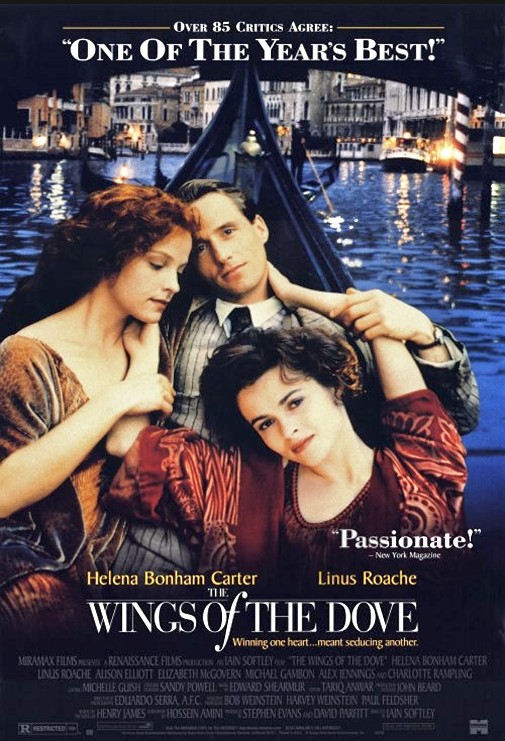
In 1997, Eduardo Serra became the first Portuguese person to be nominated for an Academy Award. This honor came thanks to his work in The Wings of the Dove, a Henry James adaptation directed by Iain Softley. This piece of trivia was one of the reasons I was so eager to watch the film as I first started to fall in love with movie awards. The other point of interest was Helena Bonham Carter, for whom I had a raging fandom in my early teens. After all, this was also the picture that had earned the actress her first nomination. It should have also won her the statuette. This was the first film I remember looking for with such avidness, going into international sites so I could order a DVD from abroad.
I fell in love with The Wings of the Dove when I was thirteen, and that passion has only strengthened in the years since. Indeed, every time I revisit it, I find new details worthy of admiration…
This time, for instance, I was struck by how sharp the editing can be, judicious and propulsive, while revealing the potential for poetry in Softley's frames. Nothing in the director's further filmography, or that of editor Tariq Anwar, has quite the same diamantine precision, making The Wings of the Dove shine all the brighter. It feels like a precious object, a rarity that manages to transcend the underestimations many might want to stick to it, wrong labels that equate costume dramas with stuffy mediocrity. There's nothing mediocre about this feature.
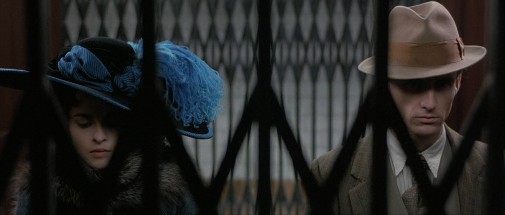
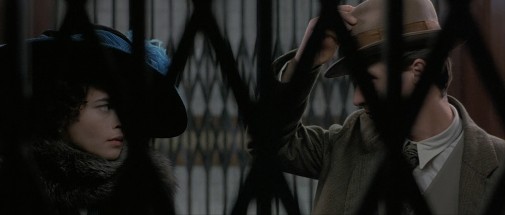
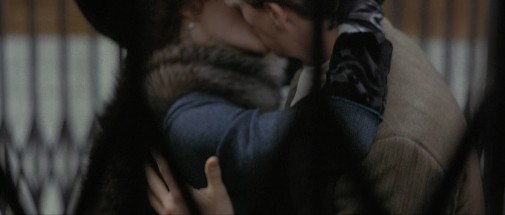
That's obvious from minute one when we meet our protagonist as she traverses through the London underground of the early 1910s. Kate Croy is the daughter of a formerly wealthy woman and a dissolute man of no means. Having recently lost her mother, she now finds herself living under the patronage of Aunt Maude. Coldly pragmatic and a bit mercenary, the older woman intends to find her penniless niece a good match, guaranteeing her a life far away from the destitute misery of the girl's father, who now wastes away in opium dens.
Money matters in this narrative, and no amount of romanticism can hide that truth. Love is a miracle, but it can't quell the hunger that comes hand-in-hand with poverty, nor does it provide other material comforts Kate has grown used to as she lives with Maude. However, heartlines of amorous devotion and sensual fixation still tether the young woman to that life she hopes to leave behind. As she walks from the train to the surface, through gates and lifts, that connection materializes beside her. He's Merton, a reform-minded journalist whom she kisses when nobody's looking.
Softley shoots this wordless introduction with devastating grace, slithering through the shadows of the London tube while the editing diffuses the distance between gestures. In three shots, cut like notes in a symphony's crescendo, we see how the lovers pretend to be unaware of the other's presence. Then, the eyes move, and bodies soon follow. Before we know it, their ascension is a passionate embrace, a dry orgasm of cinematic form articulating what could otherwise need lines upon lines of text to explain fully. They are bound to each other and inexorably pulled apart.
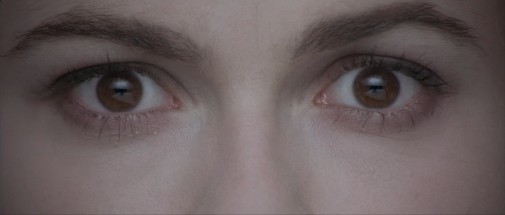
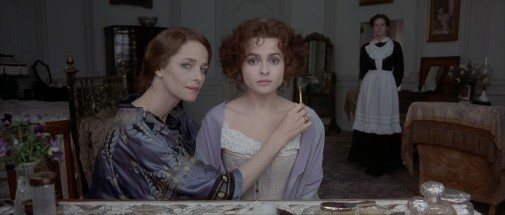
Sure, Maude has forbidden Kate from meeting her paramour, but there's more to it. Though it doesn't limit itself with bookish fidelity to the source material, the socio-economic specificities of James' prose ring through the film with a crystalline clarity. The kiss cuts directly to a dramatic close-up of Kate's eyes, staring straight at the camera, only to cut to a medium that reveals the preparations for a night out. The aunt paints her niece's face and adorns her neck with fine jewelry, putting her together like a doll. And yet, there's passive acquiescence in Kate's frozen form, her eyes caught in the mirror in what could be vanity if it didn't feel quite so introspective.
Helena Bonham Carter and Charlotte Rampling could say nothing as the two women, and we'd still get the gist of the situation, its prickly complexities. It's all in the images' construction, Sandy Powell's Poiret-inspired costumes with a hint of moneyed bohemia, and Serra's lighting of Carter's face to look like lifeless porcelain. It's in the actress' intelligent gaze, complicating the perfect "deer in headlights" countenance with a thorny calculation that glistens on screen. Kate is a tricky figure, a woman overcome by forbidden desire, a romantic heroine with a realist streak and enough brutality to turn the pursuit of love into something cruel.
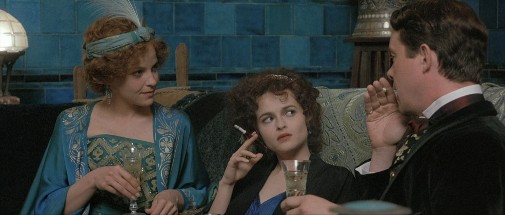
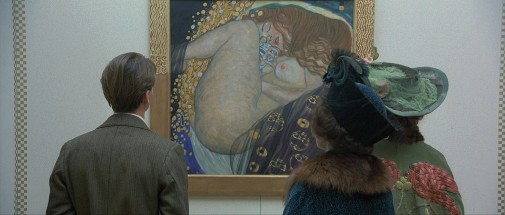
The Wings of the Dove characters are fairly multidimensional and tricky to pin down, especially Kate. However, the story isn't as complicated. She initially rejects Merton until three months after the break, when an opportunity arises on the horizon. Kate befriends Milly, an orphaned heiress from the other side of the pond, now embarking on an extended trip through the Old World. Their friendship blossoms as the English woman sees the American as a way out of her economic trap. You see, Milly's infatuated with Merton. Moreover, she's dying.
And so, Kate schemes to bring her lover and new friend together, ensuring Merton knows the situation is temporary, a means to an end. The point is to secure Milly's fortune, wait for her premature demise and then marry as they've always wanted, love and wealth brought together in one fell swoop. As the American's European odyssey leaves London for Venice, Kate finagles her way to Italy as Milly's companion and also manages to bring Merton along. Her manipulations go according to plan, though there's no happy ending in store for this consummate liar.
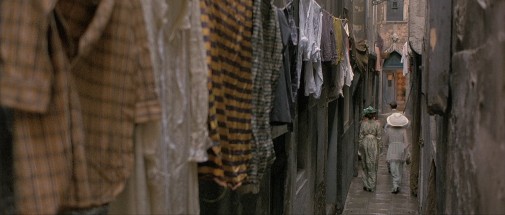
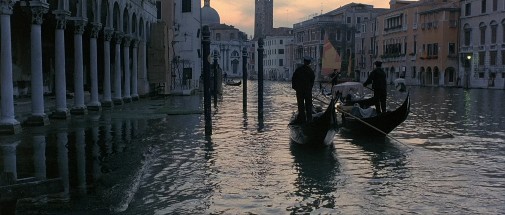
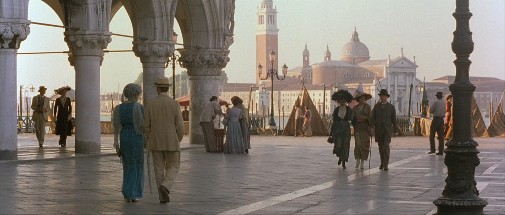
I'm not sure I fully grasped the depths of Helena Bonham Carter's Kate Croy the first time I watched The Wings of the Dove. So much of her work is internal, a storm of contradictions, hypocrisies, and perilous ambivalences rolling at the bottom of the character's soul. It's a cerebral performance that's all about hiding and revealing, secrets sometimes shared with the camera, sometimes occluded to the extreme. There's great guilt mixed with jealousy, most memorably expressed in an epistolary monologue delivered into the mirror's surface. There's also twisted generosity, perhaps even a Sapphic shade to her friendship with Milly.
It's an incredible performance, surprisingly empathetic and brimming with silent compromises, the voracious observations of a preying animal. A slew of obstinate young women marks Carter's early work, demonstrative takes on inchoate spirits still finding themselves. Her Merchant ivory films are exemplary of this. But, then, her later career found the actress ossified into a stylized type, Goth melodrama for juvenile sensibilities alternated with self-conscious prestige. She still delivers remarkable feats on the regular, but never nothing as disciplined as her Kate Croy, the kind of work that becomes richer as the viewer ages and finds new facets to James' heroine.
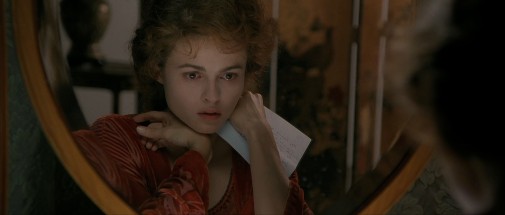
Before re-watching Softley's film, I checked out Benoit Jacquot's modernized take on the same novel dating back to 1981. No matter how much screenwriter Hosseini Amini streamlined the novel for the '97 movie, he kept its spirit, themes, and ideas. Unfortunately, the same can't be said about Jacquot. Furthermore, Dominique Sanda is no Helena Bonham Carter. Her interpretation only made me appreciate how dazzling the British thespian is in the role. Even Isabelle Huppert as Milly - by far the French film's best asset - pales compared to Alison Elliott's SAG-nominated efforts. If Carter made Kate's ultimate generosity feel like a stab, Elliott made Milly's taste of punishment.
Linus Roache is appropriately beautiful as Merton, while a cadre of supporting actors sketch galaxies of meaning at the margins of the main action. Rampling was already mentioned, but Elizabeth McGovern and Alex Jennings deserve applause. But, of course, The Wings of the Dove's greatness goes way beyond its cast, cutting, and script. The picture's visual stylists evoke a sensual world, ripe to the point of rot, devastatingly gorgeous and erotic, while also feeling like a hand tightening its grip around the audience's throat.
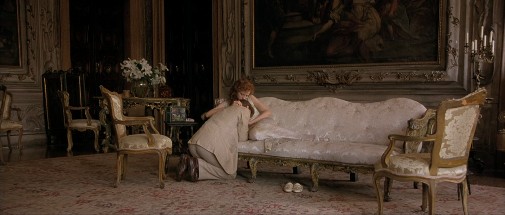
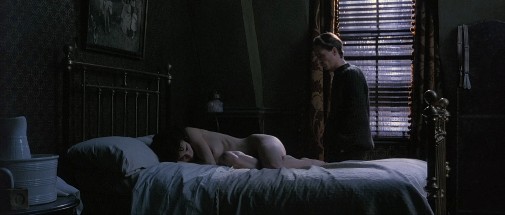
Eduardo Serra's work is elegant without being showy, rendering London a labyrinth of treacherous shadows giving way to a crying atmosphere for the film's coda. Intimate spaces feel warm and cold simultaneously, while Venice is a dream of incandescent sensualities. The sets, by Andrew Sanders, materialize a point of transition in history, right before World War I and the Spanish Influenza shrouded the world in mass death. Powell's costumes delineate social hierarchies and power dynamics, they seduce the eye of the beholder while suggesting the tactility of Fortuni pleats against naked skin. Oh, what an intoxicating picture this is, growing richer and richer with each viewing.
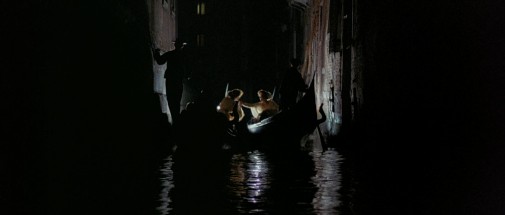
The Wings of the Dove is streaming on Max Go. You can also find it on other platforms, available to rent.



Reader Comments (14)
Marvelous movie. Luminous and full of shadows at one time.
The Venice carnival scenes (all that fire) and the silent ending always come to my mind.
Bonham-Carter plays her character with sensuality, secrecy and complexity. Elliott looks so pure and palpitating - what ever happened to her?
This isn't a film I think of as an ensemble movie but the performances and casting are insanely strong. Bonham Carter dominated the praise, of course, but for the ending to work (and it does), Roache and Elliot need hit some really complex emotions (when Millie says "I love you. Both of you" my heart just breaks).
If I were a film teacher, this is a film I would love to teach. Everything about it is so precisely calibrated and thoughtfully put together. There's something really noirish about the whole story.
There's something about some of the costume dramas from the late 90s that go in different directions than what Merchant Ivory/Jane Austen taught us (and I like many of those films). I'm thinking movies like this, Oscar and Lucinda or Angels and Insects that really stand out.
"We shall never be again as we were". Devastating final line. Then that last image of someone walking away.
This was the first Henry James novel I read. The principal as well as the supporting cast were excellent in Iain Softley's film but Alison Elliott's Milly broke my heart.
I didn't see this movie until maybe five years ago. I went in knowing absolutely nothing except HBC's Oscar nomination and was bowled over by everything. The wordless opening sequence is a storytelling masterpiece, and I've wished since my first (but not last) viewing that both Elliott and Roache had more prominent film careers.
A very worthy movie of a revisit, thank you.
this movie is a classic in every sense of the word, to the point that it's almost not tainted by the decade in which it was made. You could turn it into a black and white picture and it would make sense. HBC is tremendous in this, really a masterclass edge-of-the-seat non-stop emotional nuance where you can't look away because the acting is so married to the script that if you hear the words out of context you're missing a beat. It's Linus Roache's work that I tend to appreciate exponentially with every rewatch, and this is true of most of his movie work.There's something so unique and generous to his acting that almost undermines the presentation at first view. This movie probably makes one of the best uses of Venice in a picture, and for some reason when i think of this city I always have flashbacks here.
I looooooved this movie so much at the time but haven't seen it in years. Thanks for revisiting. I definitely need to do the same.
I don't remember if I saw that film. I will also make some praise for Eduardo Serra who shot Girl with a Pearl Earring as his work in that film is exquisite.
I hadn't seen it since about 2008 then last year I bought the DVD and had a rewatch and it's simply outstanding,I'd have given it a slew of nominations.
The carnival scenes,the beauty of Venice,everything is done perfectly.
The score also helps.
The cast are all perfect,HBC should have had the Oscar and it's a good line up that year but she is riding high above the others.
I would like to know why Elliott couldn't break through in supporting actress as apart from Moore and Basinger it's a weak category
The scenes of Venice scenery are among the most stunning I've ever seen in film. WOW!
Bonham Carter should've won Best Actress. Pretty much everything about the film is A-level, writing, design, casting, etc. - but she's absolutely remarkable in it.
Lovely post.
This takes me back to 1997, when I couldn't believe my luck in getting to sit down at a round table with the great HBC. She was doing press for Wings of the Dove, which included meeting with a small group of college-newspaper writers (I think; at least that's why I was there).
She was more petite and more sharply and archly witty than I expected - I don't know what I was expecting except maybe a variation of the Merchant-Ivory persona I'd seen her play up till then. She commented on her efforts to shake up that persona a bit, said funny things about filming her first nude/"boinking" scene, and pointedly and preemptively declined to answer any questions about her relationship with Kenneth Branagh. Despite the fact that she was filming "The Theory of Flight" with him at the time, I believe, and that it was common knowledge that the two were together and that she'd been "the other woman" that broke up his marriage to Emma Thompson. (Not that I'm blaming HBC for that; it takes two to tango, after all.)
She was, of course, great in this role, for all the reasons you state, and this was an excellent adaptation of a notoriously dense novel. Funny, it's the only one of the "late" James novels I *haven't* read, though I've bene meaning to. (It's just so long!)
A great film, very underrated, and would have deserved even more Oscar nominations, especially for Linus Roache and Alison Elliott.
@Mr Ripley79
I don't think 1997 was thought of as particularly weak, to be honest. Joan Cusack won New York. Stuart was in the hit of the year and was riding on a crest of enthusiasm. Driver may have been fifth, but Good Will Hunting was another film that had a lot of people buzzing as well. Then you had The Ice Storm (Weaver and Allen had buzz, though Allen might have been pushed lead?)
I probably would've placed Elliot in the line-up but in retrospect, that was as solid a line-up as we got.
I forgot about this film entirely. I'm excited to watch it tonight.
Elliott and Roache both ended up in the Law and Order universe, she had an arc as the Govenor's wife, I think. And he, of course, was a DA for several years.